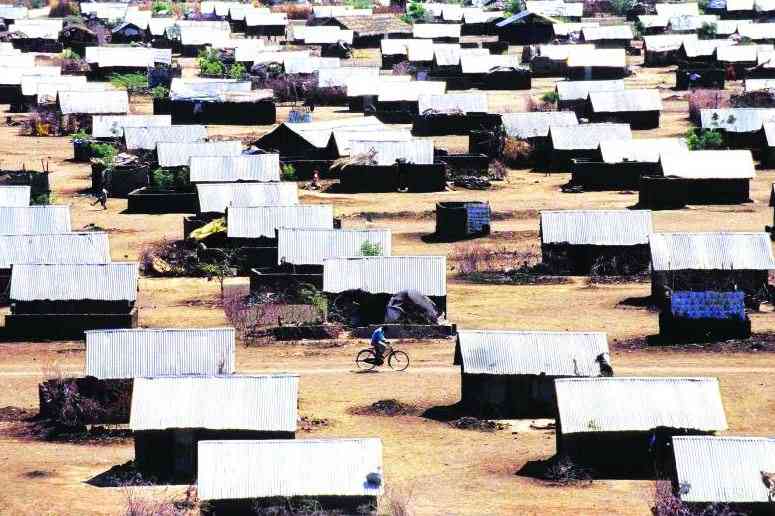A refugee lobby group has raised concern over the possible exploitation of displaced persons by predatory lenders in refugee-hosting areas.
The Refugee Consortium of Kenya (RCK) said the lack of proper documentation continues to deny refugees access to regulated credit facilities, forcing them to rely on informal and often exploitative lending systems.
Addressing the Turkana County Assembly on Thursday, RCK Executive Director Barlet Colly Jaji said the situation has entrenched economic inequalities and trapped many refugee and host families in poverty.
“Growing inequalities leave many people struggling to meet basic needs while concentrating resources among a privileged few. The systemic inequalities perpetuate cycles of poverty and limit economic mobility for marginalised groups,” Jaji said.
Follow The Standard
channel
on WhatsApp
He noted that exclusion from formal financial systems exposes vulnerable populations to unfair lending and hinders the growth of local enterprises.
“Access to financial services and credit due to a lack of documentation exposes many communities to predatory lending practices.
This, in turn, makes them face exclusion from basic economic tools. Small and micro entrepreneurs need legal frameworks that create a conducive environment free from unfair competition,” he said.
Jaji noted that despite the challenges, refugees make a significant contribution to Kenya’s economy, particularly in Turkana County, where the Kakuma and Kalobeyei settlements are located.
According to data cited by RCK from the UNHCR May 2025 report, Kakuma Refugee Camp hosts 306,414 refugees from South Sudan, Somalia, Ethiopia, Burundi, and the Democratic Republic of Congo. They live alongside 103,632 residents.
Kenya overall hosts 853,074 refugees and asylum seekers as of February 2025, making it the fifth-largest refugee-hosting country in Africa.
Studies by the Kenya National Bureau of Statistics (KNBS) indicate that the presence of refugees boosts Turkana County’s Gross Regional Product (GRP) by over three per cent, increases income per local person by 0.5 per cent, and raises total employment by about three per cent through increased spending and consumption within the camps and surrounding markets.
“Refugees are not just aid recipients; they are economic actors who contribute to local markets, create jobs, and drive trade, and adding that economic justice must be recognised as a fundamental human right,” Jaji said.
Follow The Standard
channel
on WhatsApp
A refugee lobby group has raised concern over the possible exploitation of displaced persons by predatory lenders in refugee-hosting areas.
The Refugee Consortium of Kenya (RCK) said the lack of proper documentation continues to deny refugees access to regulated credit facilities, forcing them to rely on informal and often exploitative lending systems.
Addressing the Turkana County Assembly on Thursday, RCK Executive Director Barlet Colly Jaji said the situation has entrenched economic inequalities and trapped many refugee and host families in poverty.
“Growing inequalities leave many people struggling to meet basic needs while concentrating resources among a privileged few. The systemic inequalities perpetuate cycles of poverty and limit economic mobility for marginalised groups,” Jaji said.
Follow The Standard
channel
on WhatsApp
He noted that exclusion from formal financial systems exposes vulnerable populations to unfair lending and hinders the growth of local enterprises.
“Access to financial services and credit due to a lack of documentation exposes many communities to predatory lending practices.
This, in turn, makes them face exclusion from basic economic tools. Small and micro entrepreneurs need legal frameworks that create a conducive environment free from unfair competition,” he said.
Jaji noted that despite the challenges, refugees make a significant contribution to Kenya’s economy, particularly in Turkana County, where the Kakuma and Kalobeyei settlements are located.
According to data cited by RCK from the UNHCR May 2025 report, Kakuma Refugee Camp hosts 306,414 refugees from South Sudan, Somalia, Ethiopia, Burundi, and the Democratic Republic of Congo. They live alongside 103,632 residents.
Kenya overall hosts 853,074 refugees and asylum seekers as of February 2025, making it the fifth-largest refugee-hosting country in Africa.
Studies by the Kenya National Bureau of Statistics (KNBS) indicate that the presence of refugees boosts Turkana County’s Gross Regional Product (GRP) by over three per cent, increases income per local person by 0.5 per cent, and raises total employment by about three per cent through increased spending and consumption within the camps and surrounding markets.
“Refugees are not just aid recipients; they are economic actors who contribute to local markets, create jobs, and drive trade, and adding that economic justice must be recognised as a fundamental human right,” Jaji said.
Follow The Standard
channel
on WhatsApp
By Lewis Nyaundi


